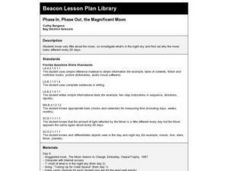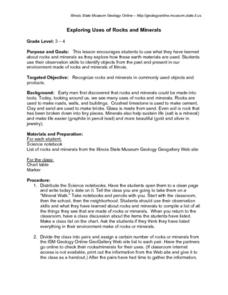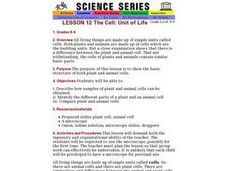Curated OER
Phase In, Phase Out, the Magnificent Moon
First graders discuss why the moon appears to change shape. They use flashlights and balls to simulate the sun's light shining on the moon during its different phases. They read books, paint pictures and write sentences about the moon.
Curated OER
What is Matter?
Sixth graders are read Goodnight Moon. They discuss the different kinds of
matter mentioned in the story. Students describe each item
they remember, they are encouraged to observe that some things are
made of smaller pieces, different...
Curated OER
Night Sky
Students discover why stars can only be seen at night. They participate in a read aloud of, "Night Sky" by Carole Stott and, "Switch on the Night" by Ray Bradbury. Using the sky objects described in the readings, they brainstorm and list...
Curated OER
Making A Terrarium
Students make a terrarium from common household items that are brought to class. They can be creative with materials but the method is set for how the mini-lab is set up. Students read a book about an ecosystem to stimulate the topic for...
Curated OER
Electronic Technology
In this electronic activity, students complete 4 short answer, 6 fill in the blank, and 4 term identifications about electronics.
Curated OER
The Dirt We Depend On- Characteristics of Dirt Reading Comprehension Worksheet
In this reading comprehension worksheet, students read a selection about dirt and soil characteristics. They answer 10 matching questions and 5 multiple choice questions based on the information given in the non-fiction article.
Curated OER
People of the Desert
Learners study the importance of caring for desert water sources. In this desert activity, students investigate water resources that are available in deserts. They listen to a read aloud about the Sonoran Desert before working in groups...
Curated OER
Who Lives Here?
Learners explore the concept of philanthropy. In this environmental stewardship lesson plan, students examine water conservation efforts in desert regions as they act as members of a city council committee investigating the issue in a...
Curated OER
Plotting Earthquakes
Students, after plotting earthquake locations on the map, should correctly; identify the pattern of earthquake locations and identify the ring of fire.
Curated OER
Organization 1: Look at What I Organized!
Students recognize that organizing things can make it easier to find things later.
Curated OER
Exploring Uses of Rocks and Minerals
Students explore the uses of rocks and minerals. They make observations to identify objects from the present and past are made out of rocks.
Curated OER
Night of the Twister
Students use reading strategies for Night of the Twister. In this reading strategies lesson, students name five major catastrophes and books about each. Students complete a vocabulary section, make inferences and predictions, read the...
Curated OER
Cell Structures and Functions
Fifth graders search into animal and cell characteristics and their functions in this seven lesson unit. Replicas of the cell are constructed out of Jell-O as students probe the internet for details of the concepts.
Curated OER
Ocean Life Mural
Students conduct Internet research on ocean life, view pictures of sea life, and create a class ocean life mural.
Curated OER
Radical Raptors
Students study the lifestyles and habitats of raptors that live in Minnesota. They play games associated with their study.
Curated OER
The Cell: Unit of Life
Students identify the parts of plant and animal cells, how samples can be obtained and what the differences are.
Curated OER
Measuring Elapsed Time
Fifth graders convert units within the same measurement system and be able to determine elapsed time. They are given a start time and an end time of a game. Students determine the amount of elapsed time from the data that is given.
Curated OER
Radical Raptors
Students define raptor, explain why raptors are important, describe unique physical characteristics of various types of raptors, and explain life cycle of raptors. Students then play Habitat Game, describe food and hunting habits of...
Curated OER
Nest Watch
Learners describe the nests of three common birds. They build a specific type of bird nest, using the same materials a bird would use. Students build a nest platform to attract a nesting pair of osprey. They observe, record, and submit...
Curated OER
Biocomplexity Research: Wanted: Biocomplexity Scientist
Middle schoolers use the internet to research and create a Biography of a Biocomplexity Scientist. They name one scientist that they have investigated in the past few years and explain what they did. Students are given a list of 30...
Curated OER
What Will I Wear to School Today?
Students describe the day's weather and observe their responses as they are written on the board. They brainstorm all different types of weather and how differences in weather determine what types of clothing we wear to school each day....
Curated OER
Desert Animal Cards
In this desert animals vocabulary worksheet, students see and study 28 cards containing a name of a desert animal. There are no directions.
Curated OER
Adobe
In this adobe worksheet, students read about adobe soil and how it was used for building because of its insulating properties. Students complete 3 short answer questions.
Curated OER
Electric Eels
In this electric eels worksheet, students read about the special muscle cells called electroplaques found in electric eels. Then students complete 3 short answer questions.

























